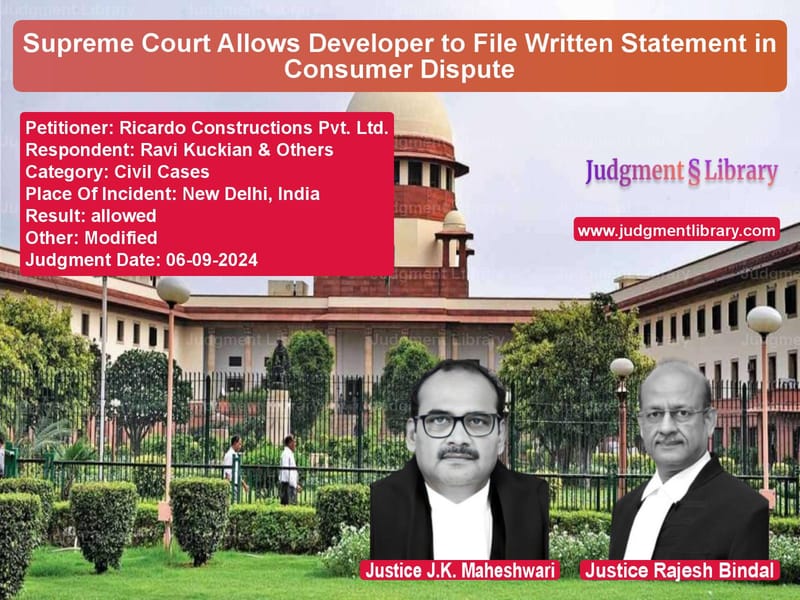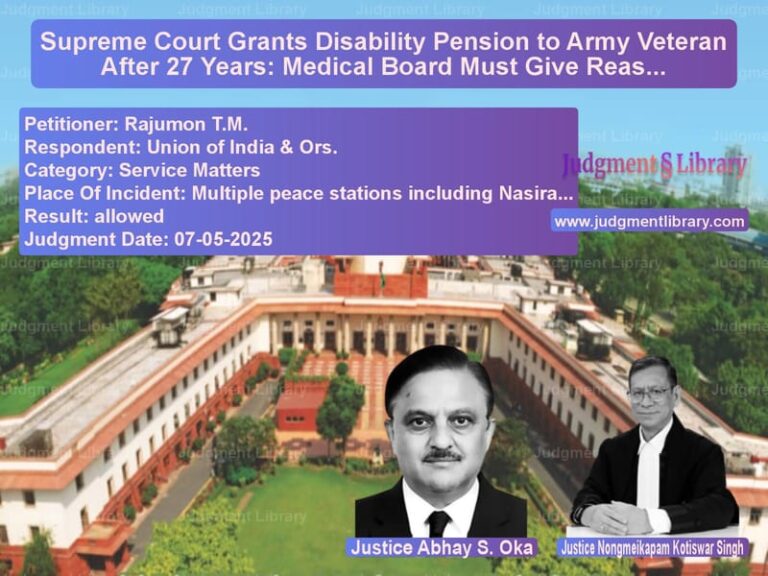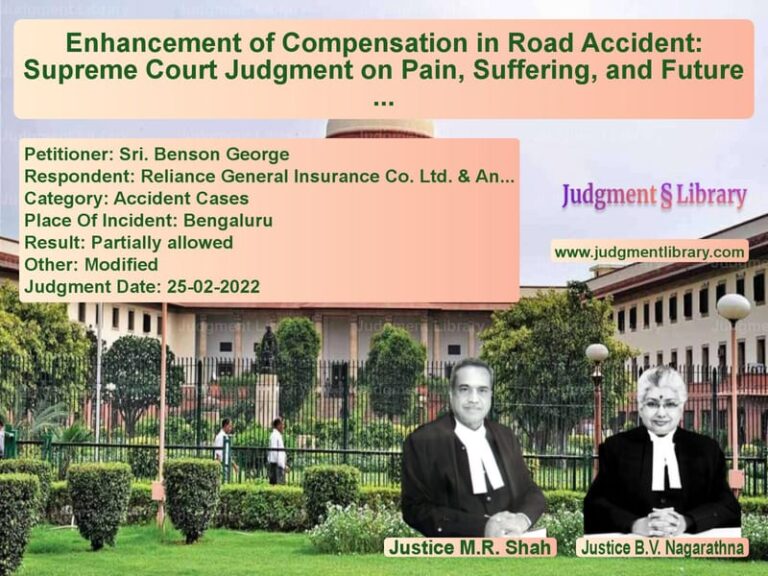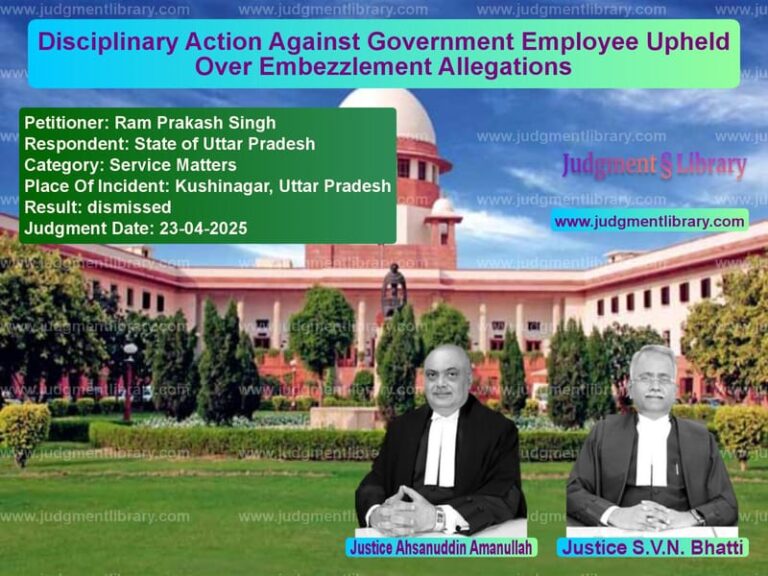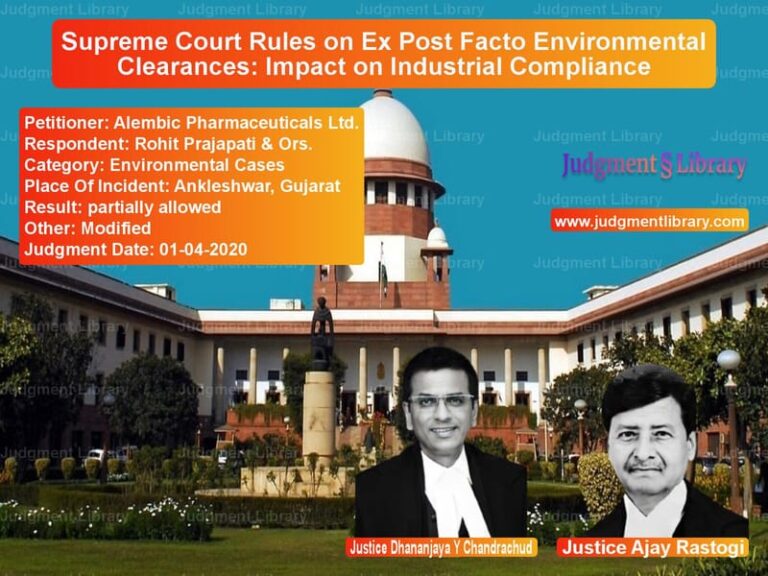Supreme Court Allows Developer to File Written Statement in Consumer Dispute
The case of Ricardo Constructions Pvt. Ltd. vs. Ravi Kuckian & Others revolves around a consumer dispute where the developer’s right to file a written statement was foreclosed by the National Consumer Disputes Redressal Commission (NCDRC). The Supreme Court, in its judgment dated September 6, 2024, overturned the NCDRC’s order and allowed the developer to file its response, subject to a cost penalty.
The ruling highlights the importance of procedural fairness in consumer disputes and clarifies the scope of filing written statements under the Consumer Protection Act.
Background of the Case
The respondents (homebuyers) had filed a consumer complaint against Ricardo Constructions Pvt. Ltd. before the NCDRC regarding delays in possession and alleged deficiencies in service. The case was filed as Consumer Complaint No. 5 of 2024, and the developer was required to file a written statement within the prescribed time limit.
During the hearing on February 6, 2024, the counsel for Ricardo Constructions appeared before the NCDRC and accepted notice. However, the developer failed to submit its written statement within the stipulated 30-day period, extendable up to 45 days under the Consumer Protection Act, 2019. On July 19, 2024, the NCDRC foreclosed the developer’s right to file its response and directed the complainants (homebuyers) to file their evidence within six weeks.
Legal Issues Raised
The case raised the following key legal questions:
- Did the developer receive proper notice and a copy of the complaint before the deadline for filing a written statement?
- Was the NCDRC justified in foreclosing the right to file a written statement despite procedural delays?
- Could the Supreme Court override the strict time limits prescribed under the Consumer Protection Act?
Arguments Presented
Appellant’s (Ricardo Constructions Pvt. Ltd.) Arguments
The developer, represented by Senior Advocate Dhruv Mehta, contended:
- The developer’s counsel had appeared before the NCDRC on February 6, 2024, but had not been provided with a copy of the complaint.
- Since notice was not formally served through court processes, the 30-day limitation period did not begin.
- Under the Supreme Court’s ruling in New India Assurance Co. Ltd. vs. Hilli Multipurpose Cold Storage Pvt. Ltd. (2020), the deadline for filing a written statement starts only upon receiving a copy of the complaint.
- The foreclosure order was excessively harsh, especially given that the case had been scheduled for further proceedings in January 2025, leaving sufficient time for the complainants to respond.
Respondents’ (Homebuyers’) Arguments
The homebuyers, represented by Advocate Aditya Parolia, countered:
- The developer had already accepted notice on February 6, 2024, and was aware of the pending proceedings.
- Under the Consumer Protection Act, the developer had a maximum of 45 days to file a response, which had already lapsed.
- The failure to file a written statement within the statutory deadline was an attempt to delay proceedings.
- The NCDRC’s order was in line with the binding precedent that limits the extension of time beyond 45 days.
Supreme Court’s Observations
The Supreme Court, comprising Justices J.K. Maheshwari and Rajesh Bindal, ruled in favor of the developer but imposed a monetary cost for the delay.
Key Findings
- While the Consumer Protection Act does prescribe strict time limits, the law must also be applied in a reasonable manner.
- The records did not indicate that a copy of the complaint was formally served on the developer’s counsel.
- Since the next scheduled hearing was in January 2025, allowing the developer to file a response would not prejudice the complainants.
- The purpose of consumer forums is to ensure fair redressal of grievances, not to dispose of cases purely on procedural technicalities.
Important Excerpts from the Judgment
“It may be too harsh to foreclose anyone’s right to file a written statement merely on conjectures and surmises.”
“While the statutory time limit must be respected, procedural fairness should not be sacrificed at the altar of strict compliance.”
Final Judgment
The Supreme Court ruled:
- The NCDRC’s foreclosure order was set aside.
- The developer was granted time until October 14, 2024, to file its written statement.
- The homebuyers were permitted to file a rejoinder by November 6, 2024, and their evidence by December 9, 2024.
- The developer was required to pay a cost of ₹1,00,000 to each of the 31 complainants, to be deposited directly into their bank accounts.
Implications of the Judgment
This ruling has significant implications for consumer protection and procedural fairness:
- Clarification on Time Limits: The Supreme Court reaffirmed that the deadline for filing a written statement starts only upon receiving a copy of the complaint.
- Balancing Efficiency and Fairness: While procedural timelines are important, courts must also ensure that parties are not unfairly penalized due to technical lapses.
- Monetary Penalties for Delay: The ruling sets a precedent that delays may be condoned, but only with costs imposed on the defaulting party.
- Impact on Developers and Homebuyers: Developers cannot exploit procedural loopholes to delay cases, while homebuyers cannot rely on technicalities to obtain one-sided orders.
This judgment reinforces the principle that consumer justice must be fair, timely, and procedurally sound, ensuring both homebuyers and developers are treated equitably.
Petitioner Name: Ricardo Constructions Pvt. Ltd..Respondent Name: Ravi Kuckian & Others.Judgment By: Justice J.K. Maheshwari, Justice Rajesh Bindal.Place Of Incident: New Delhi, India.Judgment Date: 06-09-2024.
Don’t miss out on the full details! Download the complete judgment in PDF format below and gain valuable insights instantly!
Download Judgment: ricardo-construction-vs-ravi-kuckian-&-other-supreme-court-of-india-judgment-dated-06-09-2024.pdf
Directly Download Judgment: Directly download this Judgment
See all petitions in Consumer Rights
See all petitions in Damages and Compensation
See all petitions in Public Interest Litigation
See all petitions in Judgment by J.K. Maheshwari
See all petitions in Judgment by Rajesh Bindal
See all petitions in allowed
See all petitions in Modified
See all petitions in supreme court of India judgments September 2024
See all petitions in 2024 judgments
See all posts in Civil Cases Category
See all allowed petitions in Civil Cases Category
See all Dismissed petitions in Civil Cases Category
See all partially allowed petitions in Civil Cases Category

